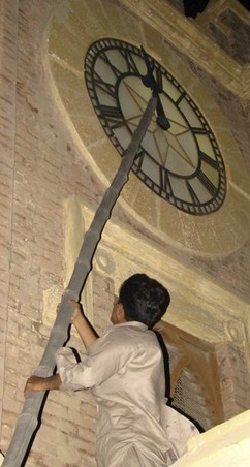Adil Najam
 As of the stroke of midnight Saturday-Sunday (May 31-June 1, 2008) Pakistan officially advanced its clocks by one hour. This “daylight savings” move is a bid to conserve energy in an increasingly energy strapped economy in conditions where everyone agrees that the energy situation is going to get worse well before it gets any better.
As of the stroke of midnight Saturday-Sunday (May 31-June 1, 2008) Pakistan officially advanced its clocks by one hour. This “daylight savings” move is a bid to conserve energy in an increasingly energy strapped economy in conditions where everyone agrees that the energy situation is going to get worse well before it gets any better.
The change puts Pakistan six hours ahead of the GMT. This change will last for three months; June-August.
Dawn reports that:
the energy conservation package approved by the Federal Cabinet on May 14 also envisages that during the next three months (June-August), all shopping plazas will close business after 9 p.m. and switch over their weekly holidays from Sunday to Friday, while industries will similarly stagger their weekly offs; WAPDA will not supply power to billboards using lights besides management of street lights. Under Cabinet’s directive the use of air conditioners will be stopped from 8 a.m. to 11 a.m. in Prime Minister House, Secretariat and other government offices, while one million energy saver bulbs will be purchased to promote culture of installing such bulbs across the country. The government has already set up a task force to control line losses.
The energy situation in Pakistan is precarious indeed. The economic loss that is being caused by it has to be immense. In all major cities, one seems to spend the entire day waiting for or recovering from the last load-shedding. Indeed, the economic working day in Pakistan is better described as the few hours of electricity in an otherwise electricity-less day, rather than by the hours of load-shedding within a “normal” flow of electricity.
The economic loss has to be measured not only by the economic value that is lost because of the lack of electricity, but also but the resources that are being diverted towards the expenditures necessitated by the new “load-shedding economy.” Those who can afford to, and many who can not, are being forced to spend obnoxious amounts of ineffective, uneconomical, noisy and polluting generators. Those who cannot, try out UPS solutions and the markets are flooded by over-priced and under-performing Chinese “rechargeable” lights and fans (some with built-in radios and other gimmicks). Most, however, have no options but to get used to the new status quo where people are already beginning to describe th day not by how many hours of load-shedding they have but by how many hours of electricity they get!
So, is “daylight savings” the answer? Or, at least, part of the answer?
 The history and reality of the idea of daylight savings is itself a fascinating one. The book, Spring Forward: The Annual Madness of Daylight Saving Time by Michael Downing, is a most fascinating account of the history and efficacy of the idea and it is not clear just how useful – if at all – the concept has been in actually saving energy.
The history and reality of the idea of daylight savings is itself a fascinating one. The book, Spring Forward: The Annual Madness of Daylight Saving Time by Michael Downing, is a most fascinating account of the history and efficacy of the idea and it is not clear just how useful – if at all – the concept has been in actually saving energy.
To look on the bright side, the decision shows that a certain seriousness has emerged in Pakistan to think seriously about conservation solutions. Everyone seems honestly interested in it. And, quite clearly, conservation has to be a key step. However, this along with the other steps in the new Energy Conservation Plan, even if appropriate, seem like an inadequate attempt to respond to a crisis that demands much more bold strategies.
A simple chronicle of just some of the many posts ATP has carried on the topic shows just how serious a crisis we are in and how much worse it is likely to become:
The Violence of Energy Insecurity
KESC, Karachi and Power Outages
Multiple Crises in Pakistan
Karachi Suffering the Heat
Bijli Bachao Mohem!
Andhair Nagri
Bijli Nama



















































I think this idea has now proved to be a total failure and no one in Pakistan really seems to be following it. Everyone is confused and talking in old as well as new times.
I am sorry, Sir, this change has got nothing to do with “slavery of Masters” etc. Lets please not make everything an ideological rant. This is just about a govt desperate to do something and having no idea what to do. I think this DST is a silly and useless idea. But not for the reasons you mention.
Getting a good idea from others is a sign of intelligence, I wish we actually got more good ideas from elsewhere including China, India and the USA. This is just not a good idea, that’s that.
I’m in Pakistan for a visit and I have to say this time change measure is laughable at the least. Most of the people in Pakistan are illiterate, they have no idea how this works. The funniest part is (after having experienced many daylight savings time changes in the U.S.) that over here people are actually adjusting their work and school hours, for e.g. now they are going to work one hour late or start classes late .. That totally beats the purpose, in my opinion. The purpose was to stay on schedule and use the extra hour of daylight, which in turn could have positive psychological effects as well as save a little (0.3% estimate for Pakistan due to this change) energy.
Most of the people (the illiterate majority) will simply adjust their schedules and go about their business — this time change will not impact their lives. They’ll consider this a temporary anomaly.
We’ve officially become the first South Asian nation to observe DST … which brings us another step closer to total slavery of our master, the United States of America. India and China don’t even divide their country into different time zones for the sake of national unity and identity and no, copy catting America is not a good thing for them (yet).
BTW, it’s Daylight Saving Time, NOT Daylight SavingS Time.
How would changing the clock by an hour make much difference in a long summer day?
In any case, as our past experience shows, moving the clock creates more confusion in Pakistan. It would probably be easier to move the office hours. That idea is less alien to us since some schools change their timings, plus we are also used to prayer timings changing with the size of the day.
As for timings, it’s better to start offices at 6 am and finish at 1 pm. Air conditioning could then be avoided for most of the office hours.